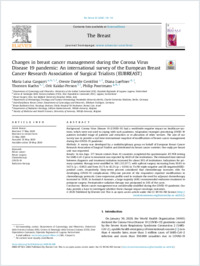Changes in breast cancer management during the Corona Virus Disease 19 pandemic : an international survey of the European Breast Cancer Research Association of Surgical Trialists (EUBREAST)
- Gasparri, Maria Luisa Faculty of Biomedical Sciences, Università della Svizzera italiana, Switzerland - Centro di Senologia Della Svizzera Italiana (CSSI), Ente Ospedaliero Cantonale (EOC), Lugano, Switzerland
- Gentilini, Oreste Davide Breast Surgery Unit, San Raffaele University Hospital, Milan, Italy
- Lueftner, Diana Department of Hematology, Oncology and Tumour Immunology Humboldt-University Berlin, Charité University Medicine, Berlin, Germany
- Kuehn, Thorsten Interdisciplinary Breast Center, Department of Gynecology and Obstetrics, Klinikum Esslingen, Germany
- Kaidar-Person, Orit Breast Radiation Unit, Oncology Institute, Sheba Hospital Tel Hashomer, Ramat Gan, Israel
- Poortmans, Philip Department of Radiation Oncology, Iridium Kankernetwerk, Wilrijk-Antwerp, Belgium - Faculty of Medicine and Health Sciences, University of Antwerp, Wilrijk-Antwerp, Belgium
-
29.05.2020
Published in:
- The breast. - 2020, vol. 52, p. 110-115
English
Background: Corona Virus Disease 19 (COVID-19) had a worldwide negative impact on healthcare systems, which were not used to coping with such pandemic. Adaptation strategies prioritizing COVID-19 patients included triage of patients and reduction or re-allocation of other services. The aim of our survey was to provide a real time international snapshot of modifications of breast cancer management during the COVID-19 pandemic. Methods: A survey was developed by a multidisciplinary group on behalf of European Breast Cancer Research Association of Surgical Trialists and distributed via breast cancer societies. One reply per breast unit was requested. Results: In ten days, 377 breast centres from 41 countries completed the questionnaire. RT-PCR testing for SARS-CoV-2 prior to treatment was reported by 44.8% of the institutions. The estimated time interval between diagnosis and treatment initiation increased for about 20% of institutions. Indications for primary systemic therapy were modified in 56% (211/377), with upfront surgery increasing from 39.8% to 50.7% (p < 0.002) and from 33.7% to 42.2% (p < 0.016) in T1cN0 triple-negative and ER-negative/HER2- positive cases, respectively. Sixty-seven percent considered that chemotherapy increases risks for developing COVID-19 complications. Fifty-one percent of the responders reported modifications in chemotherapy protocols. Gene-expression profile used to evaluate the need for adjuvant chemotherapy increased in 18.8%. In luminal-A tumours, a large majority (68%) recommended endocrine treatment to postpone surgery. Postoperative radiation therapy was postponed in 20% of the cases. Conclusions: Breast cancer management was considerably modified during the COVID-19 pandemic. Our data provide a base to investigate whether these changes impact oncologic outcomes.
- Language
-
- English
- Classification
- Pathology, clinical medicine
- License
- Open access status
- hybrid
- Identifiers
-
- RERO DOC 328580
- DOI 10.1016/j.breast.2020.05.006
- ARK ark:/12658/srd1319224
- Persistent URL
- https://n2t.net/ark:/12658/srd1319224
Statistics
Document views: 213
File downloads:
- Fulltext: 263
